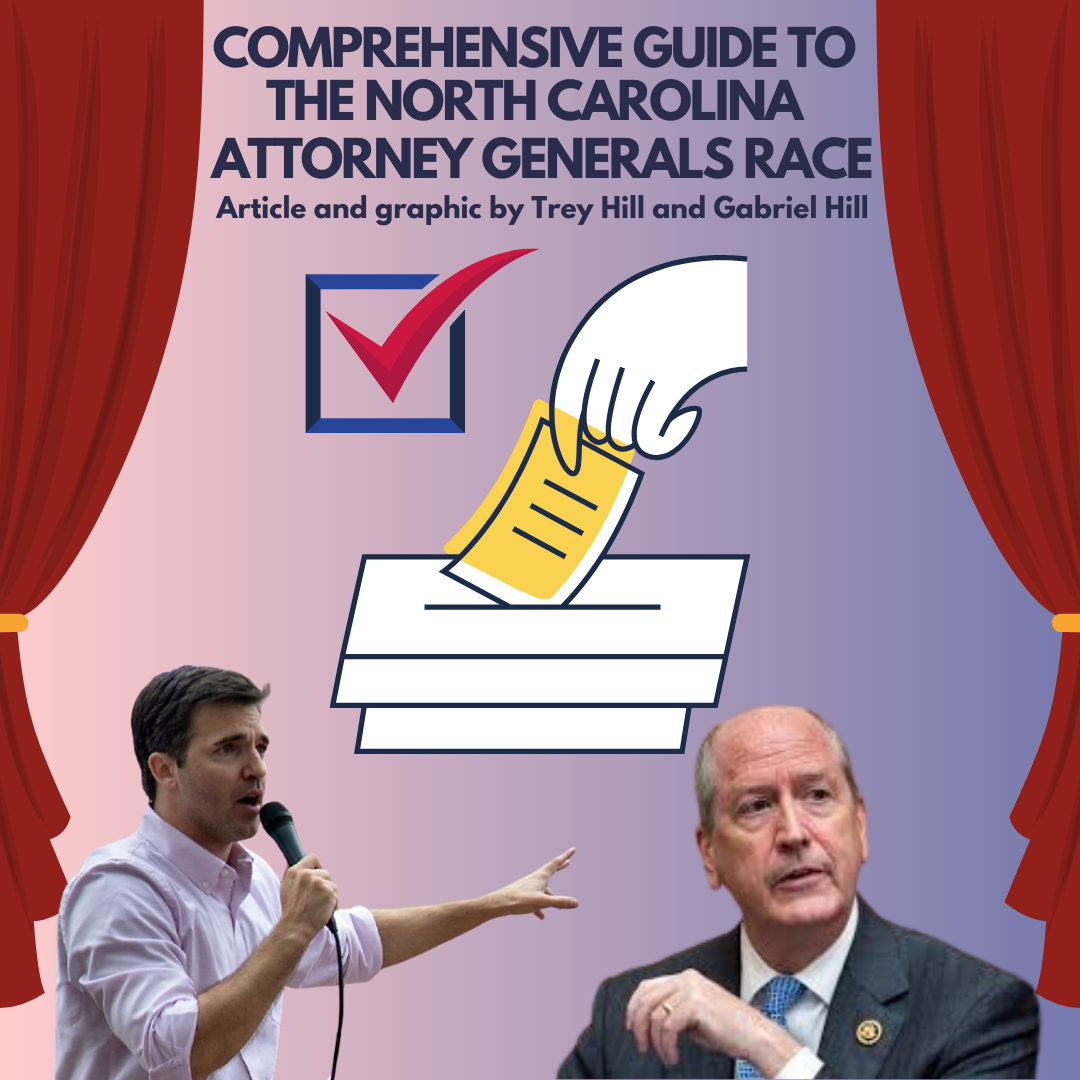On Nov. 5, the critical North Carolina attorney general election, which could have a significant impact on the future of North Carolina, will conclude. The tight battle for attorney general is between Representatives Jeff Jackson (D) and Dan Bishop (R).
Early voting is underway across the nation, including in North Carolina, where thousands of voters are giving their input into who should lead their country, state, district, and town. Although heavy focus is on North Carolina’s extremely competitive presidential race and gubernatorial race, these are just two of the more than ten statewide elections on each Tar Heel state voter’s ballot. North Carolina’s attorney general serves as the head of the Department of Justice and the state’s leading legal advisor; on the website for the North Carolina Department of Justice (ncdoj.gov), the constitutional role of the Attorney general is defined as “[representing] all state government departments, agencies and commissions in legal matters,” and “ [providing] legal opinions to the General Assembly, the Governor, or any other public official when requested.”
The attorney general also holds the power to advise lower-level state judges when permitted, although they cannot do the same for personal or corporate legal organizations.
The attorney general is additionally able to sue on behalf of the state. For example, current NC attorney general, Josh Stein, recently levied a lawsuit against the software company “Realpage” for illegally raising prices on rental facilities. Traditionally, the office of the attorney general has been one of the most non-partisan as it operates outside of both the legislative and executive branches.
This year, the attorney general race was left wide-open when Josh Stein, the incumbent attorney general, chose to run for governor against Mark Robinson. The Democrats selected Former Rep. Jeff Jackson to run in place of Stein after he was gerrymandered out of his congressional seat. Meanwhile, The GOP selected Dan Bishop, another incumbent congressman.
Before being elected to the House of Representatives, Jackson had served in the North Carolina Senate, representing the 37th district from 2014-2022. Jackson is a veteran of the North Carolina Army National Guard and a major in the Judge Advocate General’s Corps.
Politically, Jackson has built a strong reputation of being a moderate voice in Congress. In fact, “Progressive Punch”, an organization that tracks all congressional voting records, found that he had the 29th most conservative voting record among all Democrats in the 118th United States Congress.
Jackson is best known for his strong following on social media, particularly TikTok, which has catapulted him into the mainstream of not only North Carolina but national politics as well. Jackson’s specific policy proposals include a strong focus on cyber-security, protecting access to abortion, and going after the drug distribution cells in North Carolina.
Dan Bishop, a Republican, has represented North Carolina’s 8th congressional district since 2019. Although this district was redrawn to be deep red after the 2020 census, he earned his spot in Congress by a 2% lead.
Bishop is most well known for writing North Carolina’s “bathroom bill” as a member of the NC State Senate, but he is also noteworthy for his anti-war voting record., This includes breaking from most U.S. House Republicans to cut the National Defense budget and directing President Joe Biden to remove troops from Syria and repeal the authorization of use of Military Force against Iran. Bishop was also one of 147 Republicans to vote against certifying the 2020 United States Presidential election.
As Election Day grows closer, the picture of who will win this nail-biter of a race is getting no clearer. The only sure thing about this election is that it will be decided by a razor-thin margin. It could be your vote that makes Former Rep. Jackson or Former Rep. Bishop our state’s next top cop. Early voting ends on Nov. 2, so the time is now to use your voice in what Jackson has stated to be “the most expensive Attorney General race in [United States] history.”










Dashiell Moyers • Jan 24, 2025 at 1:54 PM
I actually didn’t know about Bishop’s anti-war track record. But still, I’m thankful that Jeff Jackson won.
Jaiden • Dec 2, 2024 at 6:48 PM
More political content please!